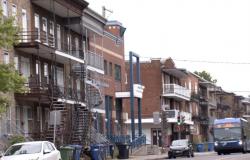This has been going on for years, and despite a recent legislative framework supposed to improve the situation, there is always something wrong.
I point out the insurance, but this is perhaps, again, only a symptom of evils which are located at higher levels, in the quality of construction and governance in co-ownership buildings.
But what’s wrong with insurance? The problem was reported to me a few years ago and it doesn’t seem to have improved since. The members of a co-ownership are, so to speak, forced to insure themselves, with their own funds.
This time, someone brought to my attention a new case where everyone inside a building had to scramble to replace a floor and other improvements in a co-owner’s unit worth, wait, did I read that correctly? More than $100,000? The bill may well be shared by 150 people (according to each person’s share), it’s annoying to have to pay because the fleet has damaged the unit of the man on the eighth floor, at the other end, whom we pass five times a year, with any luck.
It is common. More and more. Many losses today are assumed by all co-owners through special contributions, although they already pay premiums to their insurer and that of their co-ownership. The amounts involved can be considerable.
To understand the current situation, you need to know that insurance occurs at two levels in co-ownership. There is that of the union, which protects the building, and that of the co-owners, which targets the goods and what are called “rental improvements”, that is to say finishes, materials and other elements of higher value than the standards adopted during construction. You know, the quartz countertop rather than laminate, like the neighbor’s.
In a time not so long ago, when a poorly connected washer hose caused damage on four floors, the damage amounts that fell below the union’s insurance deductible were assumed by the individual insurers of the affected units. Eventually, the latter in turn made a claim against the insurance company of the co-owner of the apartment at the origin of the disaster, caused most of the time by water.
Simple? Yes and no, depending on your point of view. The insurers ended up getting tired of it, they covered more negligence than risks.
Well-managed co-ownerships have long been the exception. Even today, I cannot say whether a majority is administered like the rest of the world. Unions, made up of volunteers, sometimes lack the skills to look after assets worth millions of dollars. As for co-owners, in their building as in society, very often, it is less the notion of common good that motivates them than their immediate individual interest. Taking money out of your pockets now for a roof replacement in 20 years? “No thanks, I would have sold. By the way, if we could pay as little condo fees as possible between now and then, that would be great…”
Result: poorly maintained buildings, hit by repeated disasters. Most insurers have deserted this market. Those who remained increased premiums and deductibles, what some call the “deductible”, that part of the damage at the customer’s expense before the co-ownership insurer pays a first dollar of compensation. Insurance companies undoubtedly benefit from a lack of competition, but I don’t think they make fortunes either. If business was so booming, we would see other players coming back, but they are slow to come.
Despite two recent laws
After consultation, two laws were adopted by the CAQ in order to bring some order to all this: Law 141 (2018) which specifically affects insurance and Law 16 (2019) on co-ownership. The latter notably forced the unions to establish a schedule of major works to be carried out over the years and to consistently determine everyone’s contributions to the provident fund.
On the insurance side, unions are now required to set up a self-insurance fund equivalent to the highest deductible listed in the contract. The amounts are very high, and when a disaster occurs, the fund can suddenly be emptied. It must be bailed out quickly by special contributions. When several unfortunate events affect the same building, the premiums or the deductible or both increase, which weighs on the finances of the co-owners. Those who are just within their budget quickly find themselves in difficulty.
If the self-insurance fund is so often called upon, it is because the insurers of each of the co-owners who covered the union’s insurance deductible before are being pulled. This is the crux of the problem, introduced with law 141. Based on the fairly strict interpretation of this law, insurers only pay compensation if the fault of their clients is proven.
In the case of a water leak resulting from a poorly connected appliance, for example, it is not enough to own the appliance to be blamed. The owner would have to have connected the machine himself. Each time a disaster occurs in the slightest complicated circumstances, the union finds itself having to pay while bringing the matter before a court, to the Small Claims Division or directly to the Court of Quebec, in order to demonstrate the responsibility.
Did I tell you that these are volunteers who have other things to do in life?
What I’m told is that insurance companies use all kinds of excuses to avoid paying. In the story mentioned above, the insurer is reluctant to reimburse for its client’s improvements because the reference unit plans, which serve to distinguish what is or is not a transformation covered by the individual insurer , had not been ratified by the general meeting of co-owners.
I am not here criticizing the insurers, who have already paid out en masse, but it seems that the pendulum has swung too far to the other side. This has been going on for years, and it’s not a little column that will settle the matter, I’ve already tried.
As we increasingly promote the densification of cities, which involves, among other things, co-ownerships, wouldn’t it be a good idea to make the model more attractive. Because there, from what I hear, it still seems like a lot of trouble.
If you would like to respond to this column, write to us at [email protected]. Some responses may be published in our Opinions section. If you want to contact our columnist directly, you can do so at [email protected].






